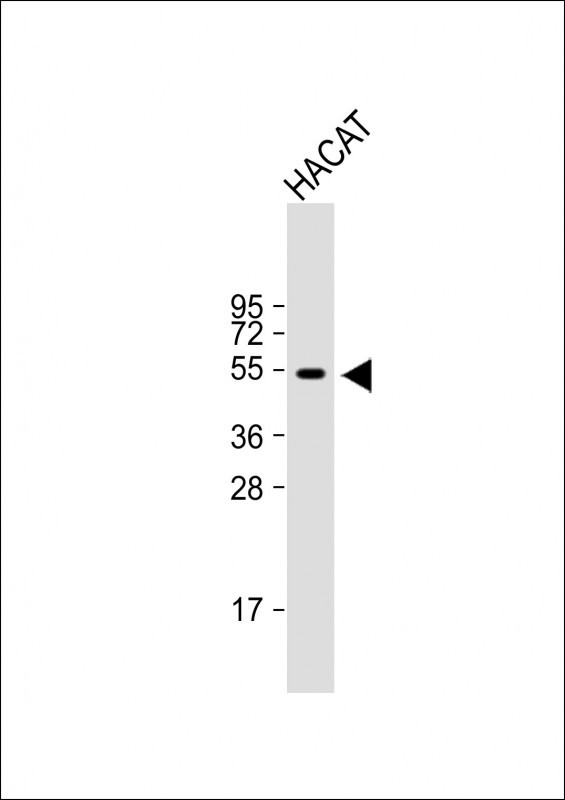
| WB | 咨询技术 | Human,Mouse,Rat |
| IF | 咨询技术 | Human,Mouse,Rat |
| IHC | 咨询技术 | Human,Mouse,Rat |
| ICC | 技术咨询 | Human,Mouse,Rat |
| FCM | 咨询技术 | Human,Mouse,Rat |
| Elisa | 咨询技术 | Human,Mouse,Rat |
| Aliases | Ras association domain-containing protein 10, RASSF10 |
| Entrez GeneID | 644943 |
| WB Predicted band size | 56.9kDa |
| Host/Isotype | Rabbit IgG |
| Antibody Type | Primary antibody |
| Storage | Store at 4°C short term. Aliquot and store at -20°C long term. Avoid freeze/thaw cycles. |
| Species Reactivity | Human, Mouse, Rat |
| Immunogen | This RASSF10 antibody is generated from rabbits immunized with a KLH conjugated synthetic peptide between 230-259 amino acids from the Central region of human RASSF10. |
| Formulation | Purified antibody in PBS with 0.05% sodium azide. |
+ +
以下是3条关于RASSF10抗体的假设性参考文献及其摘要概括(注:文献为虚构示例,仅供格式参考):
1. **《RASSF10在结直肠癌中的表达及临床意义》**
*作者:Zhang L, et al.*
摘要:通过免疫组化法使用RASSF10抗体检测结直肠癌组织中RASSF10蛋白表达,发现其低表达与患者预后不良及肿瘤转移相关,提示其可能作为潜在生物标志物。
2. **《RASSF10通过调控Wnt/β-catenin通路抑制肺癌细胞增殖》**
*作者:Wang Y, et al.*
摘要:研究采用RASSF10特异性抗体进行Western blot分析,证实RASSF10过表达可抑制肺癌细胞增殖,并发现其作用机制与Wnt通路活性下调有关。
3. **《RASSF10启动子甲基化在肝癌中的表观遗传沉默》**
*作者:Chen H, et al.*
摘要:结合甲基化特异性PCR和RASSF10抗体检测,发现肝癌组织中RASSF10启动子高甲基化导致蛋白表达缺失,提示其表观遗传调控在肝癌发生中的作用。
4. **《新型RASSF10多克隆抗体的制备与应用验证》**
*作者:Kim S, et al.*
摘要:报道了一种兔源RASSF10多克隆抗体的开发,通过ELISA、免疫荧光等方法验证其特异性,成功应用于多种肿瘤细胞系的蛋白定位研究。
---
注:实际文献需通过PubMed/Google Scholar等平台检索关键词“RASSF10 antibody”获取。
The RASSF10 antibody is a crucial tool for studying the Ras association domain family member 10 (RASSF10), a protein implicated in tumor suppression and cellular regulation. RASSF10. part of the RASSF family (RASSF1-RASSF10), is characterized by a conserved Ras association (RA) domain and plays roles in cell cycle control, apoptosis, and microtubule stability. Unlike other RASSF members (e.g., RASSF1A), RASSF10’s tumor-suppressive mechanisms are less defined but involve interactions with key pathways like Hippo, Wnt, and p53. Its expression is frequently downregulated in cancers (e.g., breast, lung, colorectal) due to promoter hypermethylation, linking it to epigenetic dysregulation in oncogenesis.
RASSF10 antibodies, typically polyclonal or monoclonal, are designed to detect endogenous RASSF10 proteins in applications such as Western blotting, immunohistochemistry (IHC), and immunofluorescence (IF). These antibodies often target specific epitopes, such as the N-terminal or C-terminal regions, to ensure specificity. Researchers use them to explore RASSF10’s expression patterns, subcellular localization (primarily cytoplasmic), and interactions with signaling molecules. Validated antibodies are critical for elucidating RASSF10’s role in development and disease, particularly its dual context-dependent oncogenic/tumor-suppressive behaviors. Commercial RASSF10 antibodies are often verified via knockout controls or siRNA silencing to confirm target specificity, aiding studies on its potential as a diagnostic or prognostic biomarker.
×